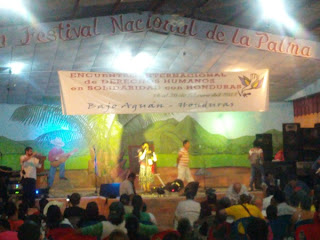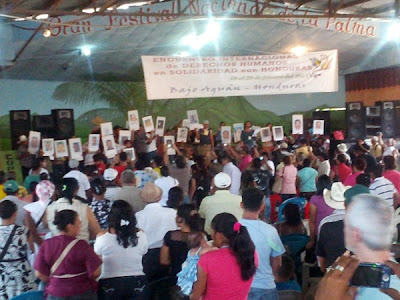
A La Voz de los de Abajo delegation of 8 people is in Honduras(February 14-22) to accompany the campesino movement and support the Internacional Encuentro por los Derecho Humanos en Aguan February 17-19. This Encuentro focused on the ongoing, increasingly grave Human Rights situation in Honduras, and particularly in the Aguan Valley where more than 60 campesinos, as well as journalists, have been assassinated by private guards of wealthy landowners, police, and the notorious Honduran military.
For two and a half days a diverse group of more than a thousand people concerned with the human rights situation in Honduras, came together in a large high school auditorium in the hot, dusty town of Tocoa, in the Aguan Valley, in Colon, Honduras. Every departmento (state) in Honduras was represented, but there was international interest in this conference and there were also participants from Nicaragua, El Salvador, Costa Rica, Guatemala, Mexico, Brazil, Cuba, the United States, and several European Countries. The delegates sat in plastic chairs on the floor of the auditorium and in the bleachers along the walls, attending to the speakers on the stage but also talking among themselves, sharing information, exchanging contacts, and building connections.
Mel Zalaya, the president of Honduras who was deposed in the June 2009 coup, “El Golpe de Estado”, was one of the first people to speak and presented one of the ongoing themes of the conference: impunity. He described being taken out of his house by a hundred armed and masked soldiers, put on an airplane to Costa Rica and left on the runway still in his pajamas.

No one, he said, has been brought to justice for this terrible crime against the rule of law in Honduras. A constitutional democracy was destroyed and no one has been held accountable. Speaker after speaker described assassinations, disappearances, torture, and intimidation that happen daily with impunity.ere were also participants from Nicaragua, El Salvador, Costa Rica, Guatemala, Mexico, Brazil, Cuba, the United States, and several European Countries. The delegates sat in plastic chairs on the floor of the auditorium and in the bleachers along the walls, attending to the speakers on the stage but also talking among themselves, sharing information, exchanging contacts, and building connections.
In addition to indispensable and heart-rending testimonials of repression in Honduras, particularly repression of the poor, the landless, and anyone who speaks out on their behalf or tries to help them organize, the conference offered a sophisticate and complex analysis of the underlying causes of difficulties faced by Hondurans. To an extent that may be surprising to visitors from wealthy countries of the north, campesinos in Honduras understand and are articulate about the economic, political, historical and cultural antecedents that contribute to their situation. The logistics of the conference were impressive. A thousand people were transported, fed, housed, and given opportunities to participate in large group decision making. It all came off without a hitch and with an overall atmosphere of camaraderie in a mutual struggle.
Finally, while deeply serious, the conference was energizing and fun. Performances included two of the original members of the Nuevo Trova movement from Cuba, dancers from Garifuna communities, traditional Baile Folklorica, rappers from one of the most successful land recuperation communities, spoken word drama, and popular Latin American music.
The Encuentro was a vivid reminder of the deadly problems Hondurans face everyday, but also a celebration of international solidarity in the face of repression, and a challenge to redouble efforts towards a time when there will be safety, justice, and democracy in this beautiful country.
More videos, pictures, and other information from the Encuentro is available: http://mioaguan.blogspot.com/












No comments:
Post a Comment